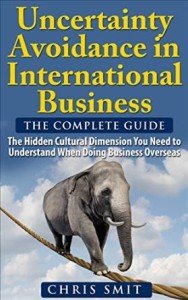 Culture and Personality and Cultural Traits
Culture and Personality and Cultural Traits
I get the question very often during a Cultural Awareness Training: “What is the relationship between Culture and Personality?” and “What’s the difference between cultural traits and personality traits?”.
This article is an attempt to shed some practical, non-academic light on the relationship between Culture and Personality. Let me start by saying that the question is actually invalid… (but do read on!)
Cultural Traits ≠ Personal Traits
Comparing culture and personality doesn’t make sense when you look at the definition of Professor Geert Hofstede: “Collective programming of the collective mind” (I know the definition is somewhat longer…).
The critical word here is “Collective“. When we want to talk meaningfully about a culture we compare one “collective” with another “collective“. And “Personality” is not a collective but refers to an individual. Meaning that one person (and his or her personality) does not make up a culture.
But What About Personality Tests Like MBTI®?
Good point! There are a number of well-known and well-validated personality tests out there. MBTI® is one of them.
A relatively short article on MBTI® and Culture can be found here.
It turns out to be that when you look at personality and culture and take two countries that have a lot of cultural similarities (they are not identical but they are similar), the way personalities (=MBTI® type) are similar in those countries does not mean that the observable behavior is the same.
The national culture seems to dominate the so-called “type” (in the case of MBTI®
An Example
Let’s pick two countries that have a lot of cultural similarities (except for one of Hofstede’s dimensions): the UK and the US. Again the US and the UK are not identical, but they are similar.
Looking only at the broad scores on the MBTI® test, they appear to be very similar; almost identical. Using Hofstede’s cultural dimensions the only significant difference between the two countries is in the dimension Uncertainty Avoidance (the UK scores lower than the US).
So even though the MBTI® scores are almost the same, the “preference” for Introvert behavior is much greater in the UK than in the US (where it is more extrovert)
This difference in preference of expression (introvert for the UK and more extrovert for the US) typically can be linked to the difference in scores on the Hofstede dimension Uncertainty Avoidance.
Personality and Culture In Reality
My personal experience is that culture plays a much larger role in everyday life than the definition of Hofstede “allows“.
One day I was having a meeting in Japan with a Japanese colleague. He told me very bluntly how he disliked his job and disliked his boss even more. This gave me the idea that he was very direct as a person (and personality).
However, the next day, when we were having a team meeting (me being the only European, the rest Japanese), he did blend in seamlessly with the rest of his Japanese colleagues. Displaying the for me so very familiar collectivistic behavior.
Another article that talks about a cultural awareness definition can be found here.
Get a Taste of How Chris Presents, Watch his TEDx Talk
 Call Direct: +32476524957
Call Direct: +32476524957
 European Office (Paris) Whatsapp: +32476524957
European Office (Paris) Whatsapp: +32476524957
The Americas (USA; Atlanta, GA; también en Español): +1 678 301 8369
Book Chris Smit as a Speaker
If you're looking for an Engaging, Exciting, and Interactive speaker on the subject of Intercultural Management & Awareness you came to the right place.
Chris has spoken at hundreds of events and to thousands of people on the subject of Cultural Diversity & Cultural Competence.
This is What Others Say About Chris:
- “Very Interactive and Engaging”
- “In little time he knew how to get the audience inspired and connected to his story”
- “His ability to make large groups of participants quickly and adequately aware of the huge impact of cultural differences is excellent”
- “Chris is a dedicated and inspirational professional”
In addition, his presentations can cover specific topics cultural topics, or generally on Cultural differences.
Presentations can vary anywhere from 20 minutes to 2 hours and are given worldwide.
Book Chris now by simply sending an email. Click here to do so.
Read more about what Chris can do for you.
- Percentage of People Rating a Presentation as Excellent 86%
- Rating the Presentation as Practical 89%
- Applicability of Chris' presentation 90%
About Peter van der Lende

Peter has joined forces with Culture Matters.
Because he has years and years of international business development experience joining forces therefore only seemed logical.
Being born and raised in the Netherlands, he has lived in more than 9 countries of which most were in Latin America.
He currently lives in Atlanta, Georgia (USA) with his family.
You can find out more at https://expand360.com/
Or find out what Peter can do for you here.
- Performance Reviews and Appraisal System - 20 January 2026
- 199 AI, Leadership, and Cultural Differences with Crispin Thompson - 13 January 2026
- 198 Cultural Differences and Government with Maria Paula Correa - 18 November 2025




 Call Direct: +32476524957
Call Direct: +32476524957 European Office (Paris) Whatsapp: +32476524957
European Office (Paris) Whatsapp: +32476524957
Hi Chris, great article as always, and thanks for covering this topic. Although I understand your comment about the question “being invalid”, I am still intrigued. For example, I believe that countries with High Uncertainty Avoidance would typically value/expect punctuality, however people with a “Perceiving” preference in their MBTI profile prefer flexibility and spontaneity. So, are there fewer people with a “P” MBTI preference in countries with High Uncertainty Avoidance, or would those individuals just behave “atypically” with respect to punctuality in their culture and contribute to the “bell curve distribution” of expected punctuality in that country?
I hope I’ve explained myself well enough 🙂
Thanks again,
Neville
Hi Neville,
Thanks for the compliment and comment!
I think I do understand your question… 😉
As far as the number of people having a “P” profile: I don’t think that high UAI scoring cultures will have less of a “P” population.
In high UAI cultures, Time is used to structure society, leaving plenty of other “life variables” to be flexible.
So the “typical” German (who does not exist) with a “P” profile would still be Punctual, but will be flexible with his dress code for instance, or in his choice of food on the menu.
Hope makes any sense, and that I have been able to answer your question. Let me know otherwise.